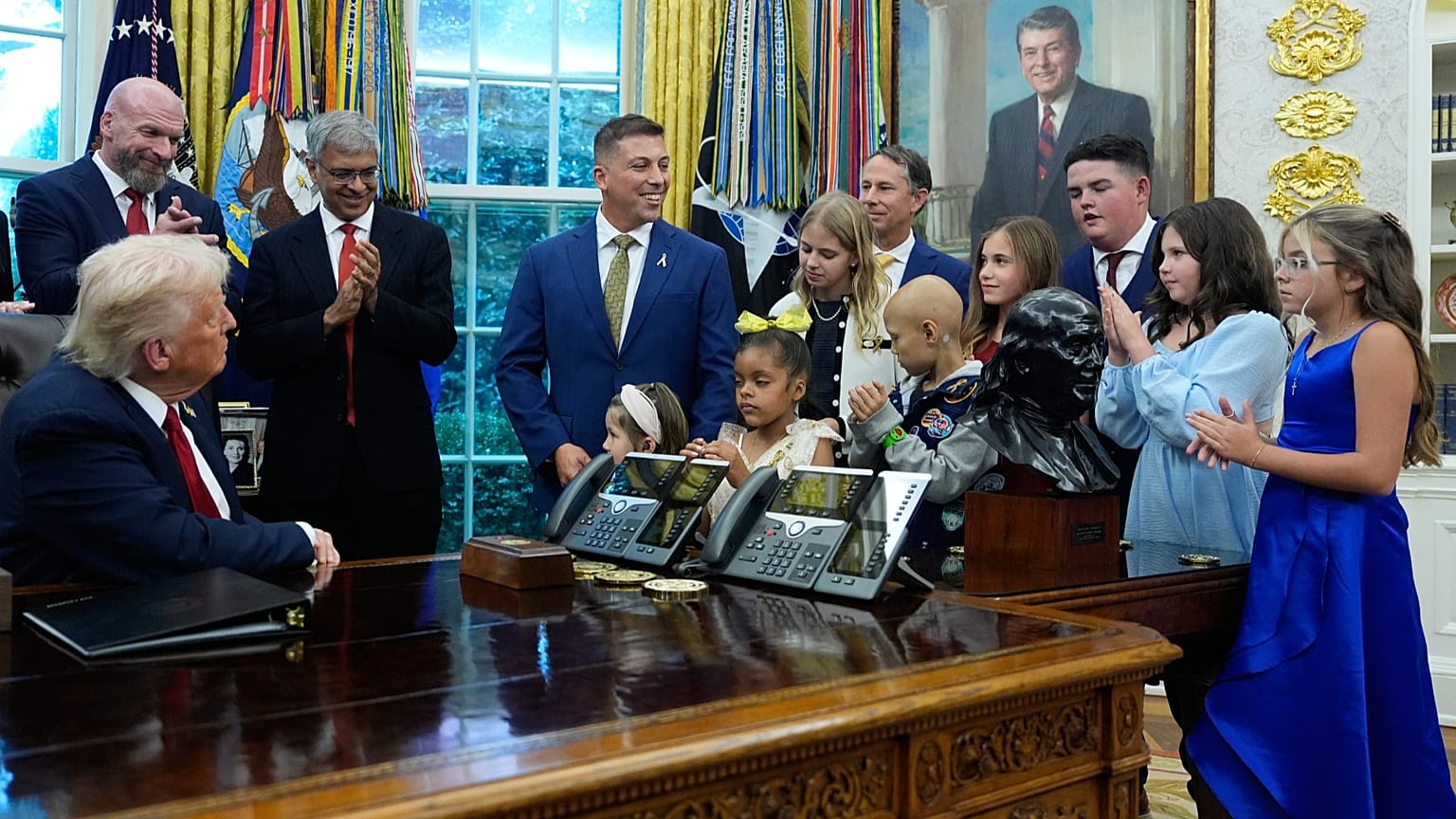Health
Trump Signs Executive Order to Boost AI in Childhood Cancer Fight

President Donald Trump has signed an executive order aimed at harnessing artificial intelligence (AI) to enhance efforts in combating pediatric cancer. The order allocates an additional $50 million to a childhood cancer data initiative, which was first established during Trump’s initial term. This new funding doubles the previous commitment, bringing the total investment in this initiative to $100 million.
The initiative focuses on gathering and analyzing extensive medical data to leverage AI in improving diagnostic processes, expediting clinical trials, and refining prevention strategies. Speaking in the Oval Office, Trump stated, “We’re going to hook up the artificial intelligence with all of the other things that we have at hand.” He expressed optimism about the potential impact on young cancer patients, saying, “You’re all going to be better very soon,” while addressing young cancer survivors present during the announcement.
Despite this increase in funding, the executive order comes at a time when federal science budgets are facing significant cuts. The National Institutes of Health (NIH) has seen reductions, and several grants, particularly those supporting long-standing pediatric cancer research networks, have been eliminated. Recently, the Pediatric Brain Tumor Consortium, which has provided access to experimental treatments for over 25 years, was informed that it would no longer receive federal support.
Pediatric cancer, though relatively rare, remains the leading cause of disease-related death after infancy among children in the United States. According to the American Cancer Society, approximately 9,550 children are expected to be diagnosed with cancer in 2025. While survival rates have shown significant improvement—falling by over 50 percent since 1975—the incidence rates have steadily increased since the 1970s.
Globally, cancer affects around 400,000 children and adolescents under the age of 19 each year, as reported by the World Health Organization. Unfortunately, pediatric cancer research remains significantly underfunded, comprising less than 10 percent of the federal cancer research budget, according to the Children’s Cancer Foundation.
The executive order’s funding boost is crucial for the Childhood Cancer Data Initiative, which aims to propel research and innovation in the field. However, broader cuts to federal science funding have raised concerns among advocacy groups. The American Cancer Society Cancer Action Network has cautioned that proposed reductions could severely hinder progress in reducing childhood cancer mortality, stating that such cuts “will set this nation back dramatically in our ability to reduce death and suffering.”
As details surrounding the specific technologies and companies involved in the initiative remain under development, Trump indicated a commitment to making these advancements “so accessible to everybody.” The administration’s focus on AI in healthcare reflects a growing trend toward integrating technology in medical research and treatment, with potential implications for future pediatric cancer care.
-

 Entertainment3 months ago
Entertainment3 months agoAnn Ming Reflects on ITV’s ‘I Fought the Law’ Drama
-

 Entertainment4 months ago
Entertainment4 months agoKate Garraway Sells £2 Million Home Amid Financial Struggles
-

 Health3 months ago
Health3 months agoKatie Price Faces New Health Concerns After Cancer Symptoms Resurface
-

 Entertainment3 weeks ago
Entertainment3 weeks agoCoronation Street Fans React as Todd Faces Heartbreaking Choice
-

 Entertainment3 months ago
Entertainment3 months agoCoronation Street’s Carl Webster Faces Trouble with New Affairs
-

 Entertainment3 months ago
Entertainment3 months agoWhere is Tinder Swindler Simon Leviev? Latest Updates Revealed
-

 World3 weeks ago
World3 weeks agoBailey Announces Heartbreaking Split from Rebecca After Reunion
-

 Entertainment4 months ago
Entertainment4 months agoMarkiplier Addresses AI Controversy During Livestream Response
-

 Science2 months ago
Science2 months agoBrian Cox Addresses Claims of Alien Probe in 3I/ATLAS Discovery
-

 Health5 months ago
Health5 months agoCarol Vorderman Reflects on Health Scare and Family Support
-

 Entertainment4 months ago
Entertainment4 months agoKim Cattrall Posts Cryptic Message After HBO’s Sequel Cancellation
-

 Entertainment3 months ago
Entertainment3 months agoOlivia Attwood Opens Up About Fallout with Former Best Friend





















